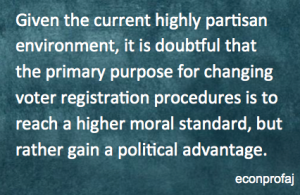A portion of the Voting Rights Act was struck down by a vote of 5-4 on June 25, 2013. Specifically, Section 4 of the Voting Rights Act was declared unconstitutional, which nullified Section 5. Within Section 4, there was a formula that determined whether certain states could make changes to their voting registration procedures. If those states wanted to make changes, then there was a process where the federal government could prohibit those changes under Section 5.
Fact or Fiction: Section 5 only applied to Southern states.
- Fiction: While most of the Southern states were covered under Section 5, the state of Alaska was also included for not including native language of the Eskimos on their ballots. It should also be noted that North Carolina and Florida are not covered throughout all parts of the state, but many counties within North Carolina and five Floridian counties had to abide by Section 5. There were also five counties in New York; four counties in California; and two counties in South Dakota that were not exempt. Lastly, two townships in Michigan, Allegan County and Saginaw County, also were subject to Section 5 requirements.
Fact or fiction: States will now be able to institute literacy tests.
- Fiction: Section 2 of the Voter Rights Act remains in place and prevents states from instituting voter registration laws that would impose any type of literacy test.
Fact or fiction: In all likelihood, voter turnout among the minority and poor will fall in states that institute voter ID laws.
- Likely, But Not Fact: Most changes in states will involve imposing voter ID requirements. When looking at driver license rates among races, African Americans and Hispanics are less likely to have a driver’s license than whites. While they can obtain a state-issued ID, that involves multiple steps and requirements differ across states, so that will lead to greater confusion and likely discourage some from voting altogether. Even though media scrutiny might spark previously uninterested voters to vote out of anger, that will likely dissipate over time.
Fact or fiction: Revoking part of the Voting Rights Act will not impact early voting procedures.
- Fiction: Typically, states will try to curtail early voting procedures in the name of preventing fraud. In order to facilitate greater turnouts, some jurisdictions offered more flexible options to vote on the weekend and extending times when one can vote. On traditional Tuesdays, it is possible that some voters will not be able to get off work in time to vote.
Fact or fiction: Obtaining a state-issued ID is free.
- Conditional Fact: This is commonly misunderstood. While obtaining a state-issued ID will be paid by the state, that does not include the potential cost in obtaining documentation showing your identity. You cannot be issued a state ID unless you have documentation proving who you are. Requirements vary by state, but if you cannot obtain your birth certificate or Social Security card, then replacing either will be an extra cost. Also, women, who must change their names due to a change in marital status, may be subject to additional costs in obtaining adequate documentation.
Fact or fiction: The Supreme Court ruling means that nothing can be done to prevent voter disenfranchisement.
- Fiction: Congress can pass alternative legislation that addresses the concerns outlined by the justices. One option that can minimize voter disenfranchisement is to allow the federal government oversight of all states, who wish to change their voter registration procedures. Justice Roberts uses the example where black turnout in Mississippi was higher than black turnout in Massachusetts to demonstrate the unfairness of subjecting to a stiffer requirement when there are possible more egregious examples of discrimination in states not covered under Section 5. However, one can surmise that it will be hard to get Congress to reach consensus on allowing the federal government the power to approve any changes to voting practices in all states.
Fact or fiction: Changes in voter registration procedures are free from political motivations.
- Fiction: While there might be pure motives from some voting officials wishing to improve the legitimacy of elections, it is also undeniable that minorities are traditional Democratic voting blocs. In close races, efforts to discourage even a small number of voters can be the difference in whether a candidate wins an election or not. Given the current highly partisan environment, it is doubtful that the primary purpose for changing voter registration procedures is to reach a higher moral standard, but rather gain a political advantage.
